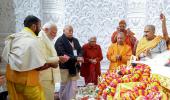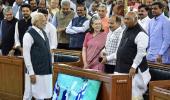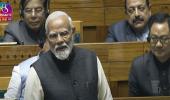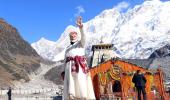The 17th Lok Sabha was adjourned sine die on Saturday bringing the curtains down on the House that witnessed several landmark decisions, with Prime Minister Narendra Modi asserting that game-changing reforms during its five-year tenure laid the foundation of a strong India.

As the adjournment of Parliament for an indefinite period with the Rajya Sabha also adjourning sine die kickstarts the final countdown for the general elections, Modi said the last five years were a period of "reform, perform and transform" with the country moving towards "big changes" at a fast pace.
The Lok Sabha elections are expected to take place in April and May.
As MPs bade goodbye to the 17th Lok Sabha which will be remembered for some defining moments, unprecedented security breach and record suspension of 100 MPs for unruly conduct, Modi lauded the outgoing House, saying many decisions including the repeal of Article 370 of the Constitution and the passage of Women's reservation bill were taken during its tenure for which many generations had long waited.
Scrapping of Article 370, which had given special status to Jammu and Kashmir, and the building of Ram temple in Ayodhya were part of Bharatiya Janata Party's core agenda for decades.
The Ram temple construction took centre stage on the last day of Parliament's budget session with both houses holding a discussion on its consecration ceremony on January 22 this year and Modi saying adoption of a laudatory resolution on the historic event will give constitutional strength to the future generations to feel proud of the country's values.
Modi also said the 17th Lok Sabha saw 97 percent productivity.
"We are moving towards the end of the 17th Lok Sabha and we resolve that the productivity should ensure 100 percent in the 18th Lok Sabha," Modi said. With 353 MPs, the BJP-led NDA had a brute majority in the lower house.
"Several challenges were met and the country was given an appropriate direction. We can say with satisfaction that the work for which many generations waited for centuries was accomplished in the 17th Lok Sabha," he said.
"These five years have been of reform, perform and transform. It is rare that we reform, perform and also see transformation. The country will keep blessing the 17th Lok Sabha," he said in his last address to the outgoing House.
The current House had the shortest number of sittings--272--among the Lok Sabhas that had a full term of five years since 1952, data compiled by think tank PRS Legislative Research showed.
In his valedictory address, Speaker Om Birla said the 17th Lok Sabha had a total of 274 sittings which lasted for 1,354 hours, 345 hours more than the scheduled time.
"A total of 387 hours were lost due to disruptions in this Lok Sabha. The total work productivity of the 17th Lok Sabha has been around 97 per cent which is the highest among the last five Lok Sabhas," he said.
"The 17th Lok Sabha passed 222 bills. During this period 202 bills were introduced and 11 bills were withdrawn by the government."
The Lok Sabha also saw passage of the controversial Citizenship Amendment Bill and enactment of farm sector reforms that drew widespread year-long protests in the National Capital Region.
The protests forced the government to roll back the three contentious farm laws.
Congress leader Adhir Ranjan Chowdhury told the Lok Sabha that browbeating those who hold an alternate view should be avoided as he noted that though disruptions result in loss of legislative business, they were part of democratic system.
He said one of the key moments of the outgoing house was the switch from the old to the new building and that "old timers" like him were trying to adjust.
Speaker Birla moved a resolution on the Ram temple, describing its construction as a historic achievement, and said it will give the values of hope and unity to future generations. He later said the resolution was passed by the House.
Prime Minister Modi inaugurated the new Parliament building on May 28. He also installed the sacred 'Sengol' in the Lok Sabha chamber.
The building reflects aspirations of new India, every Indian is full of pride today, he had said.
In a major security breach on December 13 last year coinciding with the anniversary of the Parliament attack, two persons jumped into the Lok Sabha chamber from the public gallery during Zero Hour, released yellow smoke from canisters and shouted slogans before being overpowered by the MPs.
One of the accused had hidden a canister in his shoes.
In his last address in the outgoing House, Modi also took a swipe at the opposition which has constantly targeted the BJP over the temple issue.
"This is true that not everyone has the capacity for these things. Some people are brave to face it while others run away from the battlefield. But for the future record, the speeches that were made today have sensitivity, resolve and sympathy... It also takes forward the mantra of 'sabka saath, sabka vikas'."
He added, "The country has moved towards big changes at a fast pace and all members of the House made an important contribution."
For generations, people dreamt of one Constitution but this House made that possible by removing Article 370, Modi said and noted that several other important decisions like the bill for grant of 33 percent reservation to women in Parliament and legislative assemblies and criminalisation of instant triple talaq were taken as well.
India got the presidency of G-20 during this period and every state presented the country's strength and its identity in front of the world, he said.
"We can proudly say that this country might have lived under 'penal code' for 75 years but now we live under 'Nyay Samhita'," the prime minister said in reference to the new criminal laws which replaced British era Acts.
Referring to the Covid pandemic, Modi said that during the last five years, the "biggest crisis of the century" was seen, and Speaker Birla made arrangements so that parliamentary work is not hampered while ensuring the dignity of the House.
He said thousands of cumbersome compliances were removed in the last five years to make the lives of common citizens easier.
The Rajya Sabha was adjourned sine die after a short-duration discussion on the 'White Paper on the Indian Economy' and the construction of Ram temple.
Replying to the discussion on the White Paper, Finance Minister Nirmala Sitharaman accused the UPA government of mismanaging the price situation after
taking charge from the Vajpayee government in 2004, and mocked the Congress, saying 'Gur ko gobar karna inki maastaree hai' (Congress has a mastery of ruining something that has been accomplished).











 © 2025
© 2025